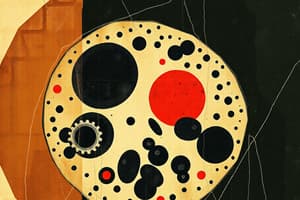Podcast
Questions and Answers
What is the function of lysosomes in a cell?
What is the function of lysosomes in a cell?
- Energy production
- Transporting substances
- Digesting macromolecules (correct)
- Protein synthesis
The Golgi complex has three main compartments.
The Golgi complex has three main compartments.
True (A)
What is the role of vacuoles in plant cells?
What is the role of vacuoles in plant cells?
Storage and maintaining turgor pressure
Chloroplasts are the organelles responsible for ______ in plant cells.
Chloroplasts are the organelles responsible for ______ in plant cells.
Match the following organelles with their functions:
Match the following organelles with their functions:
Flashcards are hidden until you start studying
Study Notes
Cell Structure Overview
- Eukaryotic cells contain various organelles with distinct functions, including those found in animal cells.
- Organelles include lysosomes, endoplasmic reticulum (ER), vacuoles, and chloroplasts, each playing vital roles in cellular activity.
Organelles and Their Functions
-
Lysosomes: Contain digestive enzymes to break down waste materials and cellular debris.
-
Endoplasmic Reticulum (ER):
- Rough ER: Studded with ribosomes; synthesizes proteins for export and cell membrane.
- Smooth ER: Lacks ribosomes; involved in lipid synthesis and detoxification processes.
-
Cytoskeleton: Provides structural support, facilitating movement within the cell.
- Microfilaments: Composed of actin; assist in muscle contraction and cell movement.
- Intermediate filaments: Provide mechanical support and help maintain cell shape.
- Microtubules: Hollow tubes that aid in transport and cell division.
Cell Membrane and Cell Walls
- Plasma Membrane: Semi-permeable membrane that controls the entry and exit of substances.
- Cell Wall: Found in plant cells; provides additional support and protection.
Golgi Complex
- Composed of three main compartments (cisternae):
- Cis Cisternae: The entry face where vesicles from the ER fuse.
- Medial Cisternae: Processes and modifies proteins and lipids.
- Trans Cisternae: The exit face where modified substances are packaged into vesicles for transport.
Specialized Structures
- Microvilli: Projections of the plasma membrane that increase surface area for absorption.
- Vacuole: Storage organelles, larger in plant cells, that hold materials like nutrients and waste.
- Chloroplast: Present in plant cells; responsible for photosynthesis, converting sunlight into energy.
Summary of Differences
- Eukaryotic cells differ from prokaryotic cells in complexity, possessing membrane-bound organelles and a true nucleus.
- Plant cells include structures such as chloroplasts and a cell wall, whereas animal cells do not.
Studying That Suits You
Use AI to generate personalized quizzes and flashcards to suit your learning preferences.




